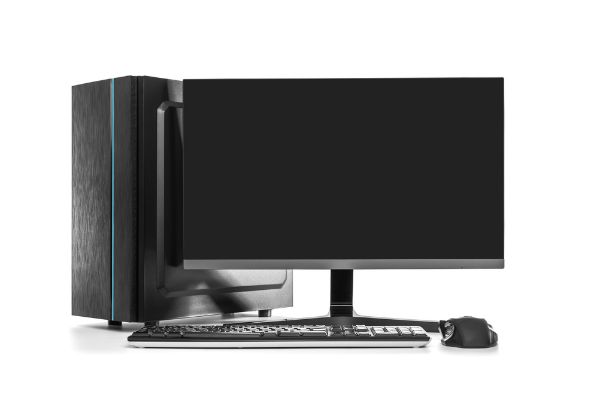Disclaimer: This post may contain affiliate links, meaning we get a small commission if you make a purchase through our links, at no cost to you. For more information, please visit our Disclaimer Page.
In order to run efficiently, even laptops need power from a main outlet from time to time. While they are great for taking with you for work or entertainment outside the home, they still rely on battery power to perform at their best in these situations.
Most of the time, any outlet that can provide your devices with mains power is going to be sufficient for your needs. However, some people might wonder if it is a good idea to invest in other accessories that can help them either regulate or get the most out of their power needs. One of these things is an automatic voltage regulator, otherwise known as an AVR.
We will discuss what an AVR is, what it does, whether it is strictly necessary, and how it might affect the performance of your machine if you decide to get one. We can also go over some of the general pros or cons of an AVR that you might hear about when you are researching them in preparation for buying one of your own.
This list may not be comprehensive, but it can better help you understand your specific power needs, and you can get a good idea of how, if at all, an AVR might help with all of this.
Table of Contents
What Is AVR for a PC?
You may have heard about things like surge protectors or uninterrupted power supplies when researching how to get power to your desktop or laptop systems.
You can think of automatic voltage regulators (AVR) as devices that come from the same family, particularly in the sense that are designed to protect your computers from any issues they might have with sudden changes to the power levels that are going to them through the mains.
It can all get a bit technical, but there are situations in which the voltage going through your mains and to your devices can either dip or spike, and these changes can occur with no warning.
In some regions, the voltage changes due to unstable power supplies to the mains might be more common. Therefore, it is important to have all of the tools at your disposal when it comes to protecting the juice that goes into your laptop or PC.
Any kind of massive spikes or dips could cause damage to some of the components, and the AVR is designed to help mitigate this risk.
It does this by keeping the voltage at a preset level. In a way, it does this by cleaning the power that goes through your system.
As the name of the device suggests, it can regulate it to 110-volt or 220-volt levels, and it will work to keep those levels steady even in the event of great surges or dips that go through the mains.
Do Laptops Need AVR?
In the strictest sense, laptops do not necessarily need AVR in order to function properly.
However, this answer comes with caveats, and it depends on your specific situation. It is natural to think that a laptop doesn’t need any kind of protection, including AVR, because it has a battery pack.
The battery can act as a backup, so there is no need for anything else, right? It is true that batteries are great simply because they can keep things going in the computer if there is a sudden loss of power and we’re doing important work.
However, if you use your laptop at home a lot, you probably keep it plugged into an outlet. This saves the battery, and it is great for when your computer is just a stationary device functioning much like a regular desktop would. In a lot of cases, your laptop will switch to battery power if you lose main power.
You’ll should be able to use that for a while, and everything should work smoothly until the power comes back on. Keep in mind, though, that the computer is still receiving power from the outlet up to the point that there is some kind of cut or failure.
Because of this, there is some risk that a sudden dip or surge could send a burst of electricity through the device. It is possible that things will still be fine, but there is a chance that the sudden change could damage some components, too.
There’s certainly nothing wrong with hedging your bets and getting a surge protector. AVR is, essentially, a somewhat better version of your standard surge protector, with added voltage regulation built into it.
If your laptop is mostly portable, or if your area does not suffer very frequent changes in the power grid, you may not need to add any AVR features to your machine. However, if it is mostly stationary, or if the region’s power is unstable, you should consider it strongly.
Is AVR Necessary on a PC?
This question is similar to the previous one, but now we’re dealing with personal computers. Unlike laptops, they’re almost always going to stay right where you set them up.
With that in mind, does AVR become more necessary? Again, it can depend on how your region’s power is set up, but there might be more of a need for AVR on a PC.
You’re dealing with rigs that can be bigger and more complex than your standard laptops, and they will always be drawing power from the mains, unlike laptops.
Further, they don’t have any kind of battery backup for power when things go down, at least not without buying some accessories yourself. In other words, there is more risk of possibly damaging some of the components due to a dip or spike in electricity, and it can also mean a loss of critical data that you’re working on at the time.
People do use PCs without AVR all the time, but there is that added risk there. An AVR can ensure stable voltage and, when combined with something like an uninterrupted power supply, it can even help make sure that your PC stays on with an even flow of power when everything else gets cut.
Does Having AVR Affect Performance on a PC?
AVR can affect a computer’s performance, but it is not a given that it will. As with most things in tech, it is a good idea to buy at least a mid-range, reputable device to hook up to your computers for the best results.
The AVR’s job is to make sure the power going to your PC is both clean and stable, so some users might wonder if this precision can affect performance. We have some general notes here, but it is a good idea to keep in mind that every system is different.
If you’re running an average PC with a mid-range CPU, you shouldn’t notice any adverse effects on performance. This is particularly true if you are clocking the CPU at stock speeds that are recommended by the manufacturer.
The AVR is just making things more stable for the voltage going through to your system, and it isn’t going to do this in such a way that there should be a noticeable drop in how your machine performs.
Conversely, a system with very high specs might have some small issues with active AVR technology, and you may need to make some adjustments to compensate. Although this isn’t a given, it is more likely than if you were running a stock PC.
This is doubly true if you want to overclock the CPU or GPU. In these cases, you’ll want to do your due diligence and find AVRs that use high-quality components from reputable brands.
There are different parts to these technologies, and you can look for components that are classed as “leak-proof” or have high-grade alloys in them. There may be some marketing language to get through, but you can find AVR parts that will have what you need.
Furthermore, there are tech communities or forums out there that can help you get what should work for your systems.
Is It OK To Use Computer Without AVR?
It should be fine for most people to use computers without AVRs. However, there are always situations where that could come back to bite you. Again, if your grid is prone to instability, it may be better to have AVR than not.
Even just something like frequent storms could affect how your PC runs when it is hooked up to mains power with no protection.
Ultimately, you have to use your own best judgment, but you can consider it a onetime investment in the overall life and health of your personal computer.
What Are the Pros and Cons of AVR for PC?
You already know that one of the main pros of AVR technology is its ability to keep the current at preset levels and protect your computer from spikes or dips. It may be best to speak out the advantages or disadvantages of AVR as they appear in relation to similar forms of technology.
Advantages
1. They provide a stable regulation of the voltage going from your mains to your computer. This is true even with brownouts that can cause some major surges that might otherwise damage some of your computer’s parts.
2. You can put them in the back of your PC. This means that it is relatively easy to plug things into them, and each item you connect to an AVR should receive the benefits of its protection.
3. Typically, an AVR will include a lot of outlets. More outlets can make it easier for you to plug in peripheral items like printers or additional monitors.
4. Many units will include USB ports to let you plug in your tablets, smartphones, and other devices.
Disadvantages
1. Particular AVRs may not be compatible with all parts on all PCs. You’ll need to know which ones can work with your PC for the best results.
2. Many AVRs are rated as being good for one big electrical surge, and you might need to replace yours after that. Surge protectors can be good for multiple surges, and some AVRs have surge protection technology built into them.
Conclusion
When you need to work on desktops or laptops in unstable environments, AVR technology can be invaluable. It might not be strictly necessary for every PC or laptop, but it provides a barrier against potential damage that could be catastrophic to either kind of machine. When paired with something like an uninterruptible power supply, it can both protect your data and keep you working or gaming at the same time, even when mains power fails.


